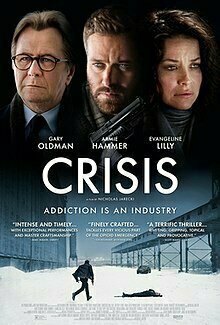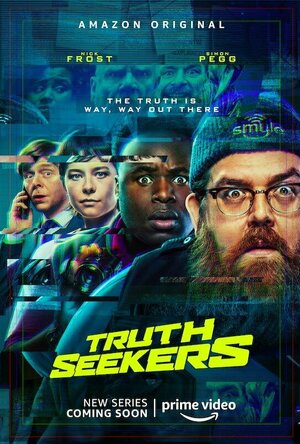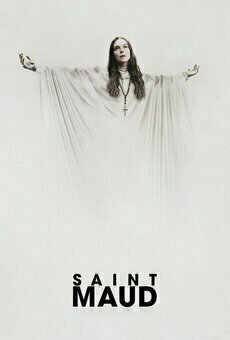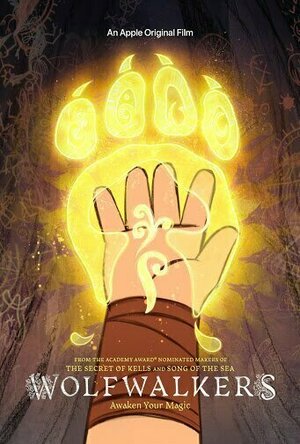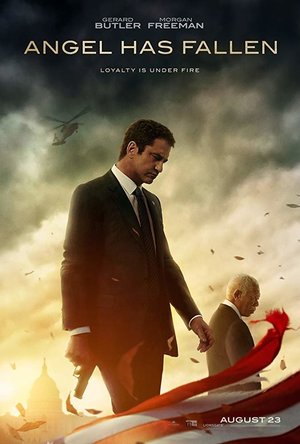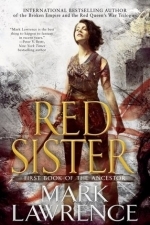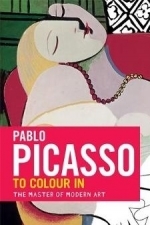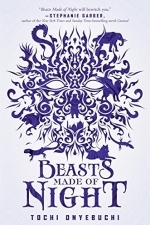Search
Search results
Sarah (7800 KP) rated Crisis (2021) in Movies
Feb 19, 2021
Worth it just for Oldman
Crisis is a 2021 film from write, director and producer Nicholas Jarecki, who previously brought us 2012's Arbitrage starring Richard Gere. Crisis is a story about drugs, namely opioids, and follows three separate yet related narratives about opioids and their impact on US society. There's an undercover DEA agent posing as a drug trafficker arranging a Fentanyl smuggling operation between Canada and the US (Armie Hammer), a recovering addict architect determined to track down those responsible for her son's involvement in narcotics (Evangeline Lilly), and a university professor (Gary Oldman) who's research laboratory uncovers dangerous revelations about a new drug that they've been paid to research by a very influential drug company and their executives (Luke Evans).
The main purpose of Crisis appears to be highlighting two entirely juxtaposed real life issues with opioids - the illegal smuggling and import of street drugs and the completely legal yet questionable drugs introduced by drug companies with full support of the government. For most, neither of these stories should be particularly surprising as they're fairly common knowledge and have been featured in countless films and documentaries over the years, although I think this may be the first time the two stories have been shown together in a film. And for Crisis this really works - showing the two contrasting issues makes for a more interesting and unique story rather than concentrating solely on one that we've seen many times before, especially as its split into three separate narratives.
However, the problem with Crisis is that not all of the narratives are as engaging as intended. Evangeline Lilly puts in a wonderful and emotional performance as architect and mother Claire, but her narrative becomes a little unrealistic as she becomes bent on revenge at those responsible for involving her son in the drugs underworld. And unfortunately Armie Hammer's narrative as undercover federal agent Jake is nothing original, with a smuggling operation and drugs bust that we've seen in many other films, some of which I'm afraid have done it a lot better. The most interesting narrative though is that of Gary Oldman as Dr Tyrone Brower, whose struggle over whether to tell the truth about a new dangerous drug or take the money from his drug company employers is a surprisingly thrilling morality tale. It's helped by a superb turn from Oldman himself and a wonderful supporting role from Greg Kinnear (who I've adored since 1997's As Good As It Gets), and the verbal sparring scenes between Brower and Kinnear's university Dean are probably the best in the film. It's a shame however that Luke Evans isn't given as much to do with his part in this narrative, even with his questionable American accent.
The biggest problem I had with all of the narratives is that unlike similar films that intertwine related narratives that eventually intersect dramatically (think 2006's Best Picture Oscar winner Crash), the narratives here don't all come together in the way I was expecting, which was rather disappointing.
Cinematography-wise, director and writer Jarecki does a good job as the film looks and feels good, and really highlights the US and Canadian settings. The soundtrack only adds to the overall tense and suspenseful feel of the film, although it does feature the typical pulsing, drum beat style that seems to be standard for a modern thriller. And the script, while possibly a little clichéd especially around the drugs bust and smuggling, is good and with his supporting acting role as Jake's fellow DEA agent Stan, Nicholas Jarecki could be one to watch in future.
Overall, Crisis is a good thriller that tells the story of well-known drug issues in a different way and does well in highlighting real life concerns. For the most part it succeeds in bringing an interesting set of narratives together for a fairly gripping albeit slightly long film, and despite my preconceptions about how its intersecting storylines should play out, it is an enjoyable watch, although for the most part thanks to the talents of Gary Oldman.
The main purpose of Crisis appears to be highlighting two entirely juxtaposed real life issues with opioids - the illegal smuggling and import of street drugs and the completely legal yet questionable drugs introduced by drug companies with full support of the government. For most, neither of these stories should be particularly surprising as they're fairly common knowledge and have been featured in countless films and documentaries over the years, although I think this may be the first time the two stories have been shown together in a film. And for Crisis this really works - showing the two contrasting issues makes for a more interesting and unique story rather than concentrating solely on one that we've seen many times before, especially as its split into three separate narratives.
However, the problem with Crisis is that not all of the narratives are as engaging as intended. Evangeline Lilly puts in a wonderful and emotional performance as architect and mother Claire, but her narrative becomes a little unrealistic as she becomes bent on revenge at those responsible for involving her son in the drugs underworld. And unfortunately Armie Hammer's narrative as undercover federal agent Jake is nothing original, with a smuggling operation and drugs bust that we've seen in many other films, some of which I'm afraid have done it a lot better. The most interesting narrative though is that of Gary Oldman as Dr Tyrone Brower, whose struggle over whether to tell the truth about a new dangerous drug or take the money from his drug company employers is a surprisingly thrilling morality tale. It's helped by a superb turn from Oldman himself and a wonderful supporting role from Greg Kinnear (who I've adored since 1997's As Good As It Gets), and the verbal sparring scenes between Brower and Kinnear's university Dean are probably the best in the film. It's a shame however that Luke Evans isn't given as much to do with his part in this narrative, even with his questionable American accent.
The biggest problem I had with all of the narratives is that unlike similar films that intertwine related narratives that eventually intersect dramatically (think 2006's Best Picture Oscar winner Crash), the narratives here don't all come together in the way I was expecting, which was rather disappointing.
Cinematography-wise, director and writer Jarecki does a good job as the film looks and feels good, and really highlights the US and Canadian settings. The soundtrack only adds to the overall tense and suspenseful feel of the film, although it does feature the typical pulsing, drum beat style that seems to be standard for a modern thriller. And the script, while possibly a little clichéd especially around the drugs bust and smuggling, is good and with his supporting acting role as Jake's fellow DEA agent Stan, Nicholas Jarecki could be one to watch in future.
Overall, Crisis is a good thriller that tells the story of well-known drug issues in a different way and does well in highlighting real life concerns. For the most part it succeeds in bringing an interesting set of narratives together for a fairly gripping albeit slightly long film, and despite my preconceptions about how its intersecting storylines should play out, it is an enjoyable watch, although for the most part thanks to the talents of Gary Oldman.
Sarah (7800 KP) rated Truth Seekers - Season 1 in TV
Nov 8, 2020
Enjoyably British
Truth Seekers is the latest collaboration from Nick Frost and Simon Pegg, and centres around employees of a network services provider who run a YouTube channel as amateur paranormal investigators.
The series follows Gus Roberts (Nick Frost), the top installation engineer for network provider Smyle. He lives with his dad (Malcolm McDowell) and investigates paranormal activities in his spare time, running his own YouTube channel as ‘The Truth Seeker’. His boss Dave (Simon Pegg) pairs Gus with a new employee Elton John (Samson Kayo), and Truth Seekers follows the pair as they increasingly encounter paranormal and mysterious entities as they go about their daily work, including a haunted young woman called Astrid (Emma D’Arcy).
Truth Seekers starts off as a case by episode series, with a new spooky encounter every time (think Supernatural but very British) and then mid-way works into a bigger overall plot involving Julian Barratt’s Dr Peter Toynbee that seems to tie all the earlier elements together. As a supernatural horror show, this works really well. It doesn’t rely on typical jump scares, and instead uses well known horror situations to be as creepy as possible. Admittedly this is a tad cliched – think of all the known supernatural experiences you’d expect to see (psychiatric hospitals, hotels, demons and satanic books to name a few) and you’ll definitely find them here. However this doesn’t matter as they’re done well and in such a smart, creepy and very British way. Even the special effects are impressive for something that looks like it should be fairly low budget.
Whilst this is made out to be a horror comedy, it’s the comedy side that appears to be a little lacking. Don’t get me wrong, this has its’s funny and witty moments and seems to relish all of the pop culture references it throws in at every opportunity, however it doesn’t seem quite as edgy and quick witted as Frost and Pegg’s previous collaborations. Frost delivers his usual deadpan style well and is ably supported by Samson Kayo’s Elton as his rather adorable and unwitting partner. The standout though is unsurprisingly Malcolm McDowell as Gus’ dad Richard. Right from the first episode McDowell shines and is an absolute riot. Every scene he’s in gives rise to so many laughs and in particular there’s one scene featuring him going upstairs on a stair lift so slowly that nearly had me crying with laughter. But despite this the humour is maybe a little lacking from what we’d expect. I also felt like some of the pop culture references were a little forced and unnatural, which is a shame as there were also a lot that worked quite well – nods to Aliens and The Shawshank Redemption were particularly appreciated.
Truth Seekers may be lacking a little in humour, but what is there is adeptly delivered by a rather stellar cast. Pegg takes a backseat as boss Dave with an atrocious hairpiece and there are some small roles for Kelly MacDonald, Susie Wokoma and Julian Barratt, but everyone puts in a great performance no matter the screen time. McDowell undoubtedly steals the show, but the main trio of Frost, Kayo and D’Arcy carry the show well between them.
What surprised me the most about Truth Seekers is how short it was. A mere eight episodes running at 30 minutes each doesn’t seem like enough – by the end of the eighth episode I was shocked to see there wasn’t any more, although the final scenes do at least set this up for a second series that will hopefully come to fruition. I was a little concerned about the main plot involving Toynbee as it did get a little convoluted towards the end, and the final scenes do nothing but add to this and hint at a much bigger story going on. This could end up being rather good, but it could also turn what is by and large a very enjoyable British supernatural series into something rather crazy and confused. Only series two will tell.
The series follows Gus Roberts (Nick Frost), the top installation engineer for network provider Smyle. He lives with his dad (Malcolm McDowell) and investigates paranormal activities in his spare time, running his own YouTube channel as ‘The Truth Seeker’. His boss Dave (Simon Pegg) pairs Gus with a new employee Elton John (Samson Kayo), and Truth Seekers follows the pair as they increasingly encounter paranormal and mysterious entities as they go about their daily work, including a haunted young woman called Astrid (Emma D’Arcy).
Truth Seekers starts off as a case by episode series, with a new spooky encounter every time (think Supernatural but very British) and then mid-way works into a bigger overall plot involving Julian Barratt’s Dr Peter Toynbee that seems to tie all the earlier elements together. As a supernatural horror show, this works really well. It doesn’t rely on typical jump scares, and instead uses well known horror situations to be as creepy as possible. Admittedly this is a tad cliched – think of all the known supernatural experiences you’d expect to see (psychiatric hospitals, hotels, demons and satanic books to name a few) and you’ll definitely find them here. However this doesn’t matter as they’re done well and in such a smart, creepy and very British way. Even the special effects are impressive for something that looks like it should be fairly low budget.
Whilst this is made out to be a horror comedy, it’s the comedy side that appears to be a little lacking. Don’t get me wrong, this has its’s funny and witty moments and seems to relish all of the pop culture references it throws in at every opportunity, however it doesn’t seem quite as edgy and quick witted as Frost and Pegg’s previous collaborations. Frost delivers his usual deadpan style well and is ably supported by Samson Kayo’s Elton as his rather adorable and unwitting partner. The standout though is unsurprisingly Malcolm McDowell as Gus’ dad Richard. Right from the first episode McDowell shines and is an absolute riot. Every scene he’s in gives rise to so many laughs and in particular there’s one scene featuring him going upstairs on a stair lift so slowly that nearly had me crying with laughter. But despite this the humour is maybe a little lacking from what we’d expect. I also felt like some of the pop culture references were a little forced and unnatural, which is a shame as there were also a lot that worked quite well – nods to Aliens and The Shawshank Redemption were particularly appreciated.
Truth Seekers may be lacking a little in humour, but what is there is adeptly delivered by a rather stellar cast. Pegg takes a backseat as boss Dave with an atrocious hairpiece and there are some small roles for Kelly MacDonald, Susie Wokoma and Julian Barratt, but everyone puts in a great performance no matter the screen time. McDowell undoubtedly steals the show, but the main trio of Frost, Kayo and D’Arcy carry the show well between them.
What surprised me the most about Truth Seekers is how short it was. A mere eight episodes running at 30 minutes each doesn’t seem like enough – by the end of the eighth episode I was shocked to see there wasn’t any more, although the final scenes do at least set this up for a second series that will hopefully come to fruition. I was a little concerned about the main plot involving Toynbee as it did get a little convoluted towards the end, and the final scenes do nothing but add to this and hint at a much bigger story going on. This could end up being rather good, but it could also turn what is by and large a very enjoyable British supernatural series into something rather crazy and confused. Only series two will tell.
Illeana Douglas recommended Easy Rider (1969) in Movies (curated)
Bob Mann (459 KP) rated Saint Maud (2020) in Movies
Oct 6, 2020
Morfydd Clark - astonishingly good as Maud (1 more)
Expert pacing from debut director Rose Glass
"My Little Saviour": Astonishing Saint Maud delivers psycho-religious chills
Saint Maud is the debut feature from writer/director Rose Glass, and it packs a punch. The film was first seen at last year's London Film Festival, but was due for broader nationwide release soon. What a crushing disappointment it must be for Ms Glass that so few people will likely get to see it in the current climate... at least, not for a while. Since it is an effective little chiller.
Maud (Morfydd Clark) is a palliative nurse looking after ex-choreographer Amanda (Jennifer Ehle). Maud is extremely religious and feels God move in her... regularly. Acting on His guidance, Maud sets out to save the soul of her ailing bohemian charge. But is Amanda beyond reach, and how will the zealot-like Maud react to that rejection?
Morfydd Clark appears so young in this film that you would think this was her debut film. But she's actually 30 years old and has quite an impressive filmography already. Although this is her movie-lead debut, she's had a substantial part alongside Kate Beckinsale in the excellent "Love and Friendship" and smaller parts in "Crawl", "The Personal History of David Copperfield" and the fun "Pride and Prejudice and Zombies". She's likely to get more worldwide exposure soon as a young Galadriel in Amazon's new version of "Lord of the Rings".
As Maud she is simply superb - expressing such a range of joy, hurt and despair that you must think a BAFTA Rising Star nomination should be on the cards.
Clark is ably supported in the leading role by the splendid Jennifer Ehle, still so memorable to me as Elizabeth Bennett from the BBC's "Pride and Prejudice".
Scarborough is also a star of "Saint Maud". The Yorkshire seaside town is another star of the movie. Clearly filmed before lockdown, the rainy and windswept resort looks bleak and unwelcoming. And that's before Covid! Many of those struggling bars and amusement centres, as in other resorts all around the UK, are now on their last legs.
Adam Janota Bzowski supplies the impressively claustrophobic music, which deserves recognition. A scene with Maud, flicking a lighter rhythmically in time with the sonorous beat, is a masterpiece in musical choreography and editing (by Mark Towns).
At the heart of this horror-thriller is whether, following a Dawkins-style argument, fervent religious followers are less insightfully correct and more mentally unstable and misguided. When is the voice of God just the voice in your head? And how would you tell the difference anyway? Piecing together the plot and motivations of Maud was intellectually challenging and rewarding.
I always get a little tense and nervous when I see the word "horror" on a movie bill. I am NOT a great horror fan! But for me, as a 'horror movie', "Saint Maud" is of the 'horror-lite' variety. Highly watchable, it builds more in the way of creeping dread than cheap shocks. There were only a couple of jump-scares (but for me, the one in the finale was a doozy!).
A BBC interview with Rose Glass I just saw says she relates Maud's relationship with God as like many people's relationship with social media. Always looking for support, guidance and affirmation. Interesting.
This is also an obviously female-led picture. All the men are complete tools. no, really, literally they are. It makes me feel ashamed to be among their number.
Overall, "Saint Maud" is a minor classic. I didn't go in with great expectations of this one, but I was pleasantly surprised. As a small British movie, it packs a punch significantly above its weight. When I came out I was at about a 7* rating. But this is one that really stayed with me, and I've subconsciously thought about little else all day. So for that reason I am going to escalate my rating to something more appropriate.
You might struggle now to see it on the big screen, but if you can do so, it comes with a recommendation from me. I think this one could REALLY be a "Marmite film".... so if you see it, let me know what you thought with a comment on One Mann's Movies here https://rb.gy/9k93ck . (Thanks).
Maud (Morfydd Clark) is a palliative nurse looking after ex-choreographer Amanda (Jennifer Ehle). Maud is extremely religious and feels God move in her... regularly. Acting on His guidance, Maud sets out to save the soul of her ailing bohemian charge. But is Amanda beyond reach, and how will the zealot-like Maud react to that rejection?
Morfydd Clark appears so young in this film that you would think this was her debut film. But she's actually 30 years old and has quite an impressive filmography already. Although this is her movie-lead debut, she's had a substantial part alongside Kate Beckinsale in the excellent "Love and Friendship" and smaller parts in "Crawl", "The Personal History of David Copperfield" and the fun "Pride and Prejudice and Zombies". She's likely to get more worldwide exposure soon as a young Galadriel in Amazon's new version of "Lord of the Rings".
As Maud she is simply superb - expressing such a range of joy, hurt and despair that you must think a BAFTA Rising Star nomination should be on the cards.
Clark is ably supported in the leading role by the splendid Jennifer Ehle, still so memorable to me as Elizabeth Bennett from the BBC's "Pride and Prejudice".
Scarborough is also a star of "Saint Maud". The Yorkshire seaside town is another star of the movie. Clearly filmed before lockdown, the rainy and windswept resort looks bleak and unwelcoming. And that's before Covid! Many of those struggling bars and amusement centres, as in other resorts all around the UK, are now on their last legs.
Adam Janota Bzowski supplies the impressively claustrophobic music, which deserves recognition. A scene with Maud, flicking a lighter rhythmically in time with the sonorous beat, is a masterpiece in musical choreography and editing (by Mark Towns).
At the heart of this horror-thriller is whether, following a Dawkins-style argument, fervent religious followers are less insightfully correct and more mentally unstable and misguided. When is the voice of God just the voice in your head? And how would you tell the difference anyway? Piecing together the plot and motivations of Maud was intellectually challenging and rewarding.
I always get a little tense and nervous when I see the word "horror" on a movie bill. I am NOT a great horror fan! But for me, as a 'horror movie', "Saint Maud" is of the 'horror-lite' variety. Highly watchable, it builds more in the way of creeping dread than cheap shocks. There were only a couple of jump-scares (but for me, the one in the finale was a doozy!).
A BBC interview with Rose Glass I just saw says she relates Maud's relationship with God as like many people's relationship with social media. Always looking for support, guidance and affirmation. Interesting.
This is also an obviously female-led picture. All the men are complete tools. no, really, literally they are. It makes me feel ashamed to be among their number.
Overall, "Saint Maud" is a minor classic. I didn't go in with great expectations of this one, but I was pleasantly surprised. As a small British movie, it packs a punch significantly above its weight. When I came out I was at about a 7* rating. But this is one that really stayed with me, and I've subconsciously thought about little else all day. So for that reason I am going to escalate my rating to something more appropriate.
You might struggle now to see it on the big screen, but if you can do so, it comes with a recommendation from me. I think this one could REALLY be a "Marmite film".... so if you see it, let me know what you thought with a comment on One Mann's Movies here https://rb.gy/9k93ck . (Thanks).
Emma @ The Movies (1786 KP) rated Wolfwalkers (2020) in Movies
Oct 11, 2020
Coming into this I wasn't sure what to expect, an animated Apple TV film... hmm.
Robyn comes to Ireland with her father, e's been given the job of ridding the area of a pack of wolves that are venturing closer and closer to the town. Keen to hunt just like her father, Robyn sneaks out of the safety of their walled town and into the forest after him. Once there she comes face to face with a wolf, but the encounter isn't what she expected. When she eventually meets Mebh, a wild spirit who lives out in the woods, she discovers what the legend of the wolkwalkers truly means and must find a way to save the pack, and her new friend, from the wrath of the Lord Protector and her father.
The phrase "don't judge a book by its cover" hasn't felt quite so accurate as it does now. When the film starts it has the delicacy of an illustrated picture book (with a hint of Gravity Falls), the colour palette is muted and the strokes look haphazard while being in exactly the right place... and I haven't liked this style of illustration... ever... in the 19 years I was in the book industry. It feels old fashioned (yes, I know that fits with its story) and I immediately felt myself grumble at the fact I was about to sit through a whole film of it.
Wolfwalkers' story is a nice mix of folk story and themes of family and friendship. We follow Robyn as she tries desperately to break free of societies rules and those of her overprotective father, and the overall effect is a surprisingly motivational film about protecting people and doing the right thing.
The only names I recognised off the cast list were Sean Bean and Simon McBurney, and both had the right tone for this film... though Bean ever so slightly like he wasn't always acting to the best of his abilities... but that's not really noticeable when you get swept up in everything.
Our two young ladies in the cast, Honor Kneafsey as Robyn and Eva Whittaker as Mebh, were a delightful match, and when the pair were together on screen they have an amazing chemistry together.
But I want to talk about my favourite thing, and that is very specifically, Mebh. Casting, animation, script, she gets the best of everything that was thrown at this film. Her style is so amazingly accurate for the tale and her story and you can see it in every scene. Her wild characteristics, her playful nature, had all been carefully added to every moment we see her. Whittaker's enthusiastic and emotional vocals bring it all to life in such a wonderful way. Mebh is a delightful creation and full of comedic moments that really made me smile... and that hair... brilliant.
Wolfwalkers' animation (by Cartoon Saloon) might not have been to my taste in the beginning but, with the story and the amazing characters, I soon started to forget about my initial peeves. The design of everything really helps to explain the surroundings, the light and dark of the forest when we first encounter it and then evolves as we progress. The visuals when the townies start encroaching are sad but have a stunning reality to them and in the run-up to the end of the film the way they portray those events is a massive change to the style and makes for a harrowing watch. They've also come up with an ingenious way of showing the wolves and the magic that they're regarded within the story, it's an impressive visual.
All of these wonderful things were topped off with a beautiful soundtrack. Everything fits perfectly, particularly the song "Running With The Wolves" by Aurora, which gave me chills to hear.
Starting this film with such a negative feeling I really didn't think I'd be able to turn it around, but as I watched on and got pulled deeper into the tale and the characters, well, you can tell by my rating that my mind was quickly changed. Wolfwalkers was a beautiful and emotional ride that I would not hesitate to recommend to anyone.
Originally posted on: https://emmaatthemovies.blogspot.com/2020/10/wolfwalkers-movie-review.html
Robyn comes to Ireland with her father, e's been given the job of ridding the area of a pack of wolves that are venturing closer and closer to the town. Keen to hunt just like her father, Robyn sneaks out of the safety of their walled town and into the forest after him. Once there she comes face to face with a wolf, but the encounter isn't what she expected. When she eventually meets Mebh, a wild spirit who lives out in the woods, she discovers what the legend of the wolkwalkers truly means and must find a way to save the pack, and her new friend, from the wrath of the Lord Protector and her father.
The phrase "don't judge a book by its cover" hasn't felt quite so accurate as it does now. When the film starts it has the delicacy of an illustrated picture book (with a hint of Gravity Falls), the colour palette is muted and the strokes look haphazard while being in exactly the right place... and I haven't liked this style of illustration... ever... in the 19 years I was in the book industry. It feels old fashioned (yes, I know that fits with its story) and I immediately felt myself grumble at the fact I was about to sit through a whole film of it.
Wolfwalkers' story is a nice mix of folk story and themes of family and friendship. We follow Robyn as she tries desperately to break free of societies rules and those of her overprotective father, and the overall effect is a surprisingly motivational film about protecting people and doing the right thing.
The only names I recognised off the cast list were Sean Bean and Simon McBurney, and both had the right tone for this film... though Bean ever so slightly like he wasn't always acting to the best of his abilities... but that's not really noticeable when you get swept up in everything.
Our two young ladies in the cast, Honor Kneafsey as Robyn and Eva Whittaker as Mebh, were a delightful match, and when the pair were together on screen they have an amazing chemistry together.
But I want to talk about my favourite thing, and that is very specifically, Mebh. Casting, animation, script, she gets the best of everything that was thrown at this film. Her style is so amazingly accurate for the tale and her story and you can see it in every scene. Her wild characteristics, her playful nature, had all been carefully added to every moment we see her. Whittaker's enthusiastic and emotional vocals bring it all to life in such a wonderful way. Mebh is a delightful creation and full of comedic moments that really made me smile... and that hair... brilliant.
Wolfwalkers' animation (by Cartoon Saloon) might not have been to my taste in the beginning but, with the story and the amazing characters, I soon started to forget about my initial peeves. The design of everything really helps to explain the surroundings, the light and dark of the forest when we first encounter it and then evolves as we progress. The visuals when the townies start encroaching are sad but have a stunning reality to them and in the run-up to the end of the film the way they portray those events is a massive change to the style and makes for a harrowing watch. They've also come up with an ingenious way of showing the wolves and the magic that they're regarded within the story, it's an impressive visual.
All of these wonderful things were topped off with a beautiful soundtrack. Everything fits perfectly, particularly the song "Running With The Wolves" by Aurora, which gave me chills to hear.
Starting this film with such a negative feeling I really didn't think I'd be able to turn it around, but as I watched on and got pulled deeper into the tale and the characters, well, you can tell by my rating that my mind was quickly changed. Wolfwalkers was a beautiful and emotional ride that I would not hesitate to recommend to anyone.
Originally posted on: https://emmaatthemovies.blogspot.com/2020/10/wolfwalkers-movie-review.html
James P. Sumner (65 KP) rated Angel Has Fallen (2019) in Movies
Aug 21, 2019
Is the third time a charm for Mr. Butler's action thriller series?
Gerard Butler returns as Secret Service agent Mike Banning in the third entry of the "Fallen" series, picking up where London Has Fallen left off.
We see an aging and sore Banning, struggling with the rigors of his profession, torn between his love for his duty to protect the President and the smart, semi-retirement position as Secret Service Director.
This takes a little while to get going compared to most films in the genre, but it isn't too long before everything goes sideways and Banning finds himself on the run from everyone, framed for something we all know he didn't do. The question is: who did it?
Drawing obvious inspiration from classic genre entries like Die Hard, as well as more modern offerings like John Wick, Gerard Butler takes on everyone from both sides of the law as he tries to get to the bottom of the conspiracy.
Aside from the slightly slow start, the pacing of this film is spot-on, mixing balls-to-the-wall action with gripping tension - accompanied by a very clever soundtrack that enhances the experience well.
The dialogue feels real and meaningful. There's nothing cheesy, no scene-filling conversations or anything, which is always a genuine concern with this type of film. Everything is done with a purpose.
I think perhaps too much effort was made to make this a 15-certificate (an R-rating for you lovely Americans). It was more for the language than anything. The violence and fighting was well-choreographed, taking the up-close, gritty approach akin to the Bourne movies, but there was nothing here that wouldn't have made the cut for a 12A. I think they gambled with the post-Deadpool debate of having a wider audience for a 12A vs. the "it's a 15, therefore it must be good because kids aren't allowed" appeal. I'm not saying it ruins the movie, I just think it was unnecessary. The aforementioned Deadpool, for example, absolutely wouldn't have worked if it was less than a 15, so I get why they made it the way the did. But with this, it would've been the exact same film either way, so why cut out a sizable portion of cinema-goers?
That being said, I did really, really enjoy this film. Is it predictable? Sadly, yes. That probably isn't THAT shocking of a revelation, as these types of films tend to follow a similar (and usually winning) formula, but I confess to being a little disappointed that I was able to figure out the main antagonist and the overall "big bad" within three minutes of the film starting. However, to this film's credit, this predictability doesn't take away from the experience at all. It's quite honest about what it is from the get-go, and it simply doesn't care. It does what it sets out to do, and it does it very well - better than a lot of similar movies in recent times. As with all films in this genre, people tend to watch them knowing what they're getting themselves in for, so you can just relax, switch off, and enjoy the ride for a couple of hours.
I can't sign off without mentioning Nick Nolte's turn as Butler's father. His performance, while not surprising, feels almost out-of-place, as it's so damn good he deserves an Oscar nod. He probably won't get one, as films like this tend not to get noticed by the Academy, but let me tell you, he steals every scene he's in, and you feel every word he says. There's an obvious comparison to the character he portrayed in Warrior, alongside Tom Hardy and Joel Edgerton. While he gets nowhere near as much screen time here, he makes the most of what he does get, and it truly is the stand-out performance of the year so far, by a long way.
This film is a solid 7/10, and I highly recommend it. I bumped it to an 8/10 because of Nick Nolte. If I could go back and just watch his scenes again, I would. Grab the popcorn, forget about the outside world... you could do a lot worse at the cinema right now than this.
We see an aging and sore Banning, struggling with the rigors of his profession, torn between his love for his duty to protect the President and the smart, semi-retirement position as Secret Service Director.
This takes a little while to get going compared to most films in the genre, but it isn't too long before everything goes sideways and Banning finds himself on the run from everyone, framed for something we all know he didn't do. The question is: who did it?
Drawing obvious inspiration from classic genre entries like Die Hard, as well as more modern offerings like John Wick, Gerard Butler takes on everyone from both sides of the law as he tries to get to the bottom of the conspiracy.
Aside from the slightly slow start, the pacing of this film is spot-on, mixing balls-to-the-wall action with gripping tension - accompanied by a very clever soundtrack that enhances the experience well.
The dialogue feels real and meaningful. There's nothing cheesy, no scene-filling conversations or anything, which is always a genuine concern with this type of film. Everything is done with a purpose.
I think perhaps too much effort was made to make this a 15-certificate (an R-rating for you lovely Americans). It was more for the language than anything. The violence and fighting was well-choreographed, taking the up-close, gritty approach akin to the Bourne movies, but there was nothing here that wouldn't have made the cut for a 12A. I think they gambled with the post-Deadpool debate of having a wider audience for a 12A vs. the "it's a 15, therefore it must be good because kids aren't allowed" appeal. I'm not saying it ruins the movie, I just think it was unnecessary. The aforementioned Deadpool, for example, absolutely wouldn't have worked if it was less than a 15, so I get why they made it the way the did. But with this, it would've been the exact same film either way, so why cut out a sizable portion of cinema-goers?
That being said, I did really, really enjoy this film. Is it predictable? Sadly, yes. That probably isn't THAT shocking of a revelation, as these types of films tend to follow a similar (and usually winning) formula, but I confess to being a little disappointed that I was able to figure out the main antagonist and the overall "big bad" within three minutes of the film starting. However, to this film's credit, this predictability doesn't take away from the experience at all. It's quite honest about what it is from the get-go, and it simply doesn't care. It does what it sets out to do, and it does it very well - better than a lot of similar movies in recent times. As with all films in this genre, people tend to watch them knowing what they're getting themselves in for, so you can just relax, switch off, and enjoy the ride for a couple of hours.
I can't sign off without mentioning Nick Nolte's turn as Butler's father. His performance, while not surprising, feels almost out-of-place, as it's so damn good he deserves an Oscar nod. He probably won't get one, as films like this tend not to get noticed by the Academy, but let me tell you, he steals every scene he's in, and you feel every word he says. There's an obvious comparison to the character he portrayed in Warrior, alongside Tom Hardy and Joel Edgerton. While he gets nowhere near as much screen time here, he makes the most of what he does get, and it truly is the stand-out performance of the year so far, by a long way.
This film is a solid 7/10, and I highly recommend it. I bumped it to an 8/10 because of Nick Nolte. If I could go back and just watch his scenes again, I would. Grab the popcorn, forget about the outside world... you could do a lot worse at the cinema right now than this.

Notebooks for iPhone
Productivity and Business
App
This is the "iPhone only" version of Notebooks. If you want to run it on your iPad, too, you might...
Jamie (131 KP) rated Red Sister in Books
May 18, 2017
Excellent writing style (2 more)
Well developed characters
Fascinating world and magic system
A fun dark fantasy with an interesting world
Nona has a natural ability to fight and at nine years old she’s already convicted of murder. She finds herself whisked away to a special covenant that trains young girls to become assassins, and herein lies the base of the plot and all I can say is WOW. I was absolutely blown away by Red Sister.
The world building in this book is phenomenal and I want to know so much more about it. The sun is dying, the planet is slowly being enclosed in ice and with it humanity is changing, becoming desperate and looking to prophecies. There is a focus on the four races, each with unique talents in combat. The magic system is complex and is split between two schools of magic, and there is a plethora of diverse specializations for both.
On top of the detailed world, the book also nailed atmosphere. I felt a sense of wonder as Nona learned not just about fighting, but about magic and the world around her through her classes. It gave me a nostalgic feeling about a certain school of magic that I had also enjoyed in the past. I actually liked Nona a great deal. Even though she is a tiny little ass kicker she’s also extremely flawed and has a difficult time dealing with interpersonal relationships. Having a heroine who wasn’t perfect in every way was really rather refreshing. Experiencing her school days as she befriended other girls at the covenant was just plain fun and I liked most of the characters.
As Nona’s opinions of certain friends fluctuates as the story goes along, I found my opinions of those same characters changing as well. Does Nona hate this girl because she’s truly awful? Or is it because of petty jealousy and pressure from friends that her view of this other girl is distorted? I found these subtle details about Nona’s change of heart to be clever – it really shows how her character develops over the course of the story while also making me as a reader realize just how invested I was in the character.
Oh and of course, this book is full of action. Lawrence truly has a gift with words and reading descriptions of action sequences was exhilarating. The fights are extremely violent and rather brutal. I love the way this author writes. I couldn’t get enough of it!
I think the only thing that I found frustrating was how slow the characters were to seek help when faced with danger much larger than themselves. There were several points where it was obvious certain characters were up to no good, but no one ever went to the abbess or the other sisters with information. I’m talking about the kind of danger that can get someone killed. Even worse, several characters even mention to Nona that she should tell someone and she never does. I can kind of forgive the characters because all of them are young but it’s just frustrating because it feels intentional in order to draw out the story.
Overall, Red Sister has become both one of my favorite reads of the year and now one of my favorite fantasy books. I’m excited for the rest of the series and I’m very interested in exploring more of Lawrence’s work. I may have a new favorite author!
The world building in this book is phenomenal and I want to know so much more about it. The sun is dying, the planet is slowly being enclosed in ice and with it humanity is changing, becoming desperate and looking to prophecies. There is a focus on the four races, each with unique talents in combat. The magic system is complex and is split between two schools of magic, and there is a plethora of diverse specializations for both.
On top of the detailed world, the book also nailed atmosphere. I felt a sense of wonder as Nona learned not just about fighting, but about magic and the world around her through her classes. It gave me a nostalgic feeling about a certain school of magic that I had also enjoyed in the past. I actually liked Nona a great deal. Even though she is a tiny little ass kicker she’s also extremely flawed and has a difficult time dealing with interpersonal relationships. Having a heroine who wasn’t perfect in every way was really rather refreshing. Experiencing her school days as she befriended other girls at the covenant was just plain fun and I liked most of the characters.
As Nona’s opinions of certain friends fluctuates as the story goes along, I found my opinions of those same characters changing as well. Does Nona hate this girl because she’s truly awful? Or is it because of petty jealousy and pressure from friends that her view of this other girl is distorted? I found these subtle details about Nona’s change of heart to be clever – it really shows how her character develops over the course of the story while also making me as a reader realize just how invested I was in the character.
Oh and of course, this book is full of action. Lawrence truly has a gift with words and reading descriptions of action sequences was exhilarating. The fights are extremely violent and rather brutal. I love the way this author writes. I couldn’t get enough of it!
I think the only thing that I found frustrating was how slow the characters were to seek help when faced with danger much larger than themselves. There were several points where it was obvious certain characters were up to no good, but no one ever went to the abbess or the other sisters with information. I’m talking about the kind of danger that can get someone killed. Even worse, several characters even mention to Nona that she should tell someone and she never does. I can kind of forgive the characters because all of them are young but it’s just frustrating because it feels intentional in order to draw out the story.
Overall, Red Sister has become both one of my favorite reads of the year and now one of my favorite fantasy books. I’m excited for the rest of the series and I’m very interested in exploring more of Lawrence’s work. I may have a new favorite author!
Hazel (1853 KP) rated Picasso: The Colouring Book in Books
Jul 15, 2017
Educational and Fun
For a full review, including visual examples, please follow this link: https://hazelstainer.wordpress.com/20...
...
Pablo Picasso: To Colour In was published in April 2016 with the intention of using the popular fad to educate readers/colouring book enthusiasts about the techniques and secrets of the great master. Each work included in the book has a brief paragraph explaining what it is (in case you cannot tell) and a few details about Picasso’s intentions or the events happening in his life at the time.
...
Naturally, it would be impossible to produce a book of all Picasso’s recorded works, but the editors of this particular colouring book have carefully selected examples that span the majority of his life, thus encompassing the different styles he experimented with.
The author of the text – presumably Frédérique Cassegrain, who also wrote the biography and information for each included artwork – gives helpful advice about how to colour in the outlined versions of Picasso’s paintings. The paper is thick enough to be suitable for paints, particular Gouache, which is water soluble and easily blended. Alternatively, coloured pencils may be used, preferably of artistic quality, which may be more suitable for those less confident in art and design. Another option, although not mentioned by the author, are felt-tip pens. Usually, these should be avoided due to ink bleeding through the page, however, the paper is single sided, so there is no chance of damaging the following colouring page in the book.
Purchasing Pablo Picasso: To Colour In and completing the book, provides not only hours of fun and relaxation, but an opportunity to discover and understand the artist. Unlike at a gallery where the brain may switch off, being able to go away and return to the book gives us time to absorb the information and concentrate more clearly on the details of each painting.
Opposite each colouring page is a copy of the original in full colour, meaning that, if one desired, one could replicate Picasso’s work as closely as possible. By doing, rather than just looking, we begin to understand the colour choices, piece together the geometric shapes to form an image and begin to understand the thought processes of the artist.
Interestingly, there are two paintings that stand out amongst all the others. These were produced during and after the First World War, a time when Picasso returned to a more classical style of artwork. These are The Pipes of Pan (1923) and The Bathers (1918). Both show a completely different side to Picasso and would not immediately be recognised as his own work. Despite not being entirely life-like, there are no elements of Cubism or Surrealism and the colour palette is altogether natural. Picasso has focused on shading and tone to create a realistic appearance, a contrast to the flattened portraits he is known for.
...
Pablo Picasso: To Colour In will appeal to artists, art historians and other creatives with its contrast of light relief and in-depth knowledge. The book is available online at retailers such as Amazon and The Book Depository from approximately £6. If Picasso is not your thing, there are other artists available in the series of colouring books, including Klimt, Hokusai (Japanese Art), Monet, Van Gogh, Caillebotte and Manet (Impressionists), and Paul Klee. Whatever your preference, prepare to learn whilst you are relaxing and having fun.
...
Pablo Picasso: To Colour In was published in April 2016 with the intention of using the popular fad to educate readers/colouring book enthusiasts about the techniques and secrets of the great master. Each work included in the book has a brief paragraph explaining what it is (in case you cannot tell) and a few details about Picasso’s intentions or the events happening in his life at the time.
...
Naturally, it would be impossible to produce a book of all Picasso’s recorded works, but the editors of this particular colouring book have carefully selected examples that span the majority of his life, thus encompassing the different styles he experimented with.
The author of the text – presumably Frédérique Cassegrain, who also wrote the biography and information for each included artwork – gives helpful advice about how to colour in the outlined versions of Picasso’s paintings. The paper is thick enough to be suitable for paints, particular Gouache, which is water soluble and easily blended. Alternatively, coloured pencils may be used, preferably of artistic quality, which may be more suitable for those less confident in art and design. Another option, although not mentioned by the author, are felt-tip pens. Usually, these should be avoided due to ink bleeding through the page, however, the paper is single sided, so there is no chance of damaging the following colouring page in the book.
Purchasing Pablo Picasso: To Colour In and completing the book, provides not only hours of fun and relaxation, but an opportunity to discover and understand the artist. Unlike at a gallery where the brain may switch off, being able to go away and return to the book gives us time to absorb the information and concentrate more clearly on the details of each painting.
Opposite each colouring page is a copy of the original in full colour, meaning that, if one desired, one could replicate Picasso’s work as closely as possible. By doing, rather than just looking, we begin to understand the colour choices, piece together the geometric shapes to form an image and begin to understand the thought processes of the artist.
Interestingly, there are two paintings that stand out amongst all the others. These were produced during and after the First World War, a time when Picasso returned to a more classical style of artwork. These are The Pipes of Pan (1923) and The Bathers (1918). Both show a completely different side to Picasso and would not immediately be recognised as his own work. Despite not being entirely life-like, there are no elements of Cubism or Surrealism and the colour palette is altogether natural. Picasso has focused on shading and tone to create a realistic appearance, a contrast to the flattened portraits he is known for.
...
Pablo Picasso: To Colour In will appeal to artists, art historians and other creatives with its contrast of light relief and in-depth knowledge. The book is available online at retailers such as Amazon and The Book Depository from approximately £6. If Picasso is not your thing, there are other artists available in the series of colouring books, including Klimt, Hokusai (Japanese Art), Monet, Van Gogh, Caillebotte and Manet (Impressionists), and Paul Klee. Whatever your preference, prepare to learn whilst you are relaxing and having fun.
Goddess in the Stacks (553 KP) rated Beasts Made of Night in Books
Apr 19, 2018
Terrible characters (3 more)
Lack of explanation of terms
Stupid cliffhanger
Confusing geography
So this Nigerian-influenced fantasy made enough of a splash when it was released in October that I JUST got it in my hands from the library. That long wait....was not actually justified, sadly. The cover is GORGEOUS and the concept is really, really cool - the execution is lacking. I can tell that the author had the world pretty fleshed out in his mind, from the geography to the vocabulary - but he didn't actually pass that knowledge on to the reader. Kos is a walled city, but I'm not sure whether the Palace is within the walls or not? In one scene our protagonist LEAPS out of the castle and runs back the city - but in another scene he mentions that looking out the castle wall, Kos fits behind his fingernail. Kos is made up of several neighborhood plus a market - it's not small. So either his fingernail is HUGE or Kos is a pretty decent distance away. But it's written as if it only takes him about ten minutes to run there? Not to mention that he cracked a rib in the room that he leaped from (which is never mentioned again).
Oh and he winds up landing in an ivy maze out of nowhere - he couldn't see it from the palace? Let's see....the King regularly bombards neighborhoods with catapults in what's called a "baptism" but the people haven't revolted against this, for some reason. They talk about something called a "kanselo" but never define it. I -think- it's like an organized group or coalition, but I'm really not entirely sure.
The male protagonist treats every woman his age as a potential love interest, debating whether to give them his heart-stone, or whether people will think he's already given one girl or another his heart-stone - but never stops to ask if the girls are interested in HIM that way. Because of COURSE they would be, right? He's the Sky-Fist! The Lightbringer! The one whose tattoos never fade! (Eating sin-beasts causes a black tattoo to appear on your skin - on most sin-eaters these fade eventually.) Also he's just DUMB. He recalls that the sin-eater who ate his mother's sin had a certain tattoo, and when he runs across her years later, it takes him three or four encounters before realizing it's the same sin-eater. (The tattoo is a spider. Covering her FACE. It hasn't faded.) He makes stupid decisions - after nightmares of one love-interest being attacked by sin-beasts, he LEAVES HER SURROUNDED BY THEM to go run out into the city. He has at least FIVE love interests in this book. And only ONE of them seems interested in him in return.
I really wanted to like this book. The concept of sin-eating is great. But the main character and all the one-dimensional characters that surrounded him, along with the confusing geography, just turned me off. And I'm not even getting into the "ending." Yeah. Definitely throwing quotes on that because that was not an ending. The book just stops.
Skip this. It was a terrible book wrapped in a deceptively pretty package.
You can find all my reviews at http://goddessinthestacks.wordpress.com
Oh and he winds up landing in an ivy maze out of nowhere - he couldn't see it from the palace? Let's see....the King regularly bombards neighborhoods with catapults in what's called a "baptism" but the people haven't revolted against this, for some reason. They talk about something called a "kanselo" but never define it. I -think- it's like an organized group or coalition, but I'm really not entirely sure.
The male protagonist treats every woman his age as a potential love interest, debating whether to give them his heart-stone, or whether people will think he's already given one girl or another his heart-stone - but never stops to ask if the girls are interested in HIM that way. Because of COURSE they would be, right? He's the Sky-Fist! The Lightbringer! The one whose tattoos never fade! (Eating sin-beasts causes a black tattoo to appear on your skin - on most sin-eaters these fade eventually.) Also he's just DUMB. He recalls that the sin-eater who ate his mother's sin had a certain tattoo, and when he runs across her years later, it takes him three or four encounters before realizing it's the same sin-eater. (The tattoo is a spider. Covering her FACE. It hasn't faded.) He makes stupid decisions - after nightmares of one love-interest being attacked by sin-beasts, he LEAVES HER SURROUNDED BY THEM to go run out into the city. He has at least FIVE love interests in this book. And only ONE of them seems interested in him in return.
I really wanted to like this book. The concept of sin-eating is great. But the main character and all the one-dimensional characters that surrounded him, along with the confusing geography, just turned me off. And I'm not even getting into the "ending." Yeah. Definitely throwing quotes on that because that was not an ending. The book just stops.
Skip this. It was a terrible book wrapped in a deceptively pretty package.
You can find all my reviews at http://goddessinthestacks.wordpress.com
